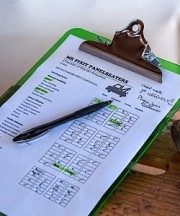Busy professionals like you are relying more on online learning to gain and hone new and existing skills. You can learn at your own pace and do it anywhere as long as there’s an Internet connection.
You read blogs and e-mail newsletters to keep abreast of latest trends in your industry. You read both free and paid e-books and even pay for an e-course to acquire new skills. You are so “social” that you use Facebook, Twitter, Linkedin and Google Plus to network and get tips from the gurus in your field.
Whether free or paid, there’s no denying that information overload is a burden. How can you learn anything if there’s too much noise over the Internet? How do you navigate through the web so can acquire the information you need and ignore useless stuff? Here are some tips to make the most use of online learning.
1. Focus on what you need to learn now
The fastest and most effective way to learn a particular skill is to focus on something that you need to apply now and not something which you perceive will be useful three years down the road. If your life, business or career depends on it, there’s a high incentive for you to learn it ASAP.
Let’s say you are a marketing executive who wants to use social media to increase the popularity of your company’s products. So focus on just reading and subscribing to blogs/industry newsletters on social media marketing. Enroll in an e-course or even get some one-on-one tutorial. Just focus on getting the information that you need and ignore the rest.
2. Store and classify possibly-related stuff
If you read something which is sort of relevant or something that you might need in the near future, put them in a file which you can access anytime. This ensures that you don’t lose important data but at the same time keep you in focus on what you are working on at the moment.
I suggest that you get a free account from Evernote where you can keep and tag all the stories, blog posts and newsletters that you received for future reference.
3. Edit your RSS feed
If possible, limit your RSS subscription to about five to ten blogs. You don’t need to follow everyone. With so much information in the Internet, blogs belonging to the same niche usually mimic each other and dish out the same information. So pick a blog which most resonate with you and serves your interest – it doesn’t matter if it’s not among the most popular blogs.
Unsubscribing is for me an act of liberation as I get to shut out the noise without having to lose my focus on what I want. At least once a month, I check my RSS feed and unsubscribe from blogs which I believe are boring and useless.
4. Apply online learning
You can’t become an expert in something just because you read all the posts, articles and books about the subject. You need to apply what you learned and see what works. So set aside time, about one to three hours a week, absorbing and applying the information that you acquired.
For example, I’m currently enrolled in an e-course on SEO copy writing. So on weekends or when I come home from work, I read the modules, look for keywords and practice writing optimized blog posts.
5. Rinse and repeat
Learning – online and off – is a lifelong process. And it will take more than reading a few blog posts and enrolling in an e-course. You need to read and apply the same thing over and over again until it sticks and help you build your expertise.
—
How do you apply online learning in your day to day life? Share your stories in comments.







Discussion